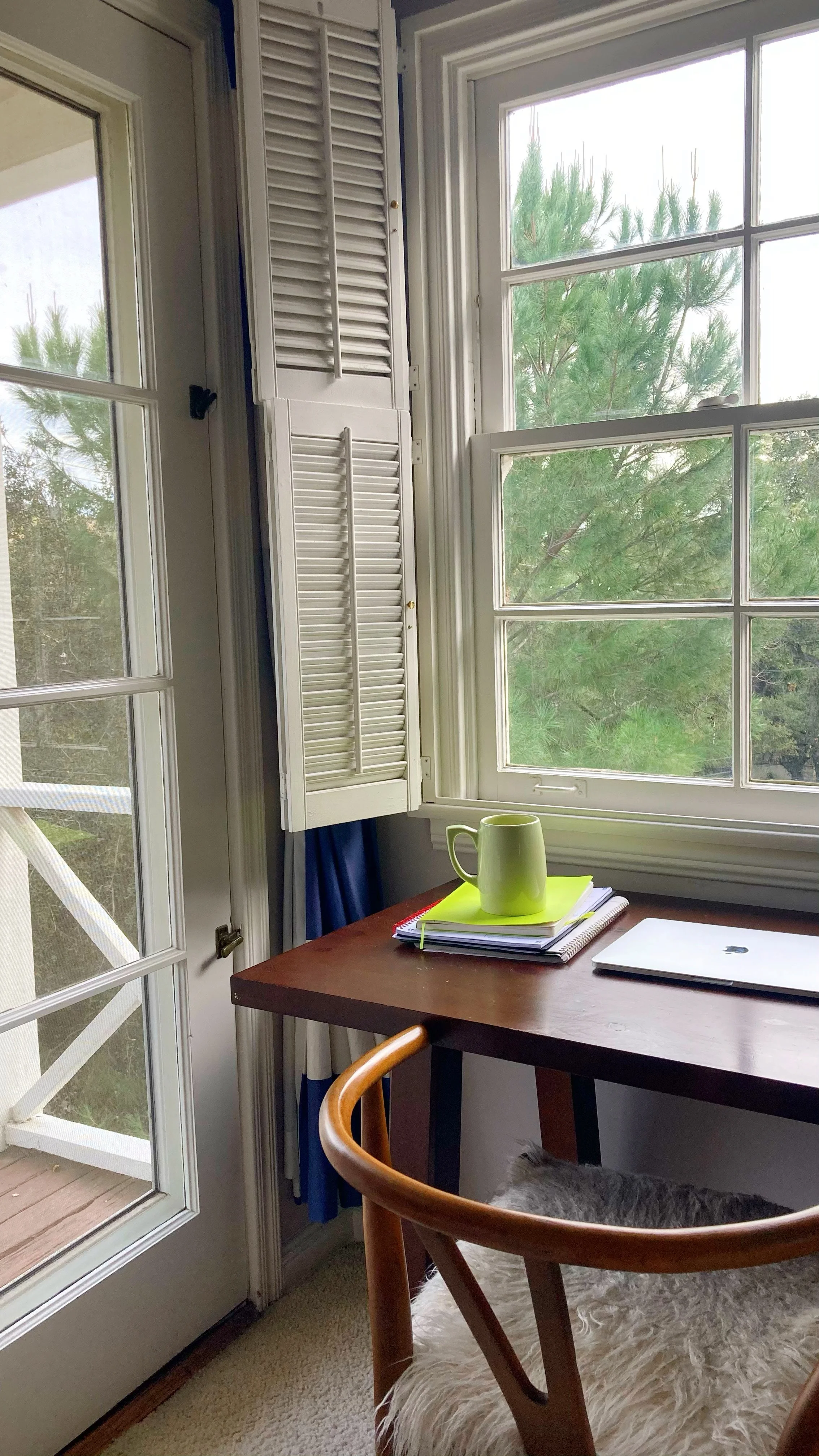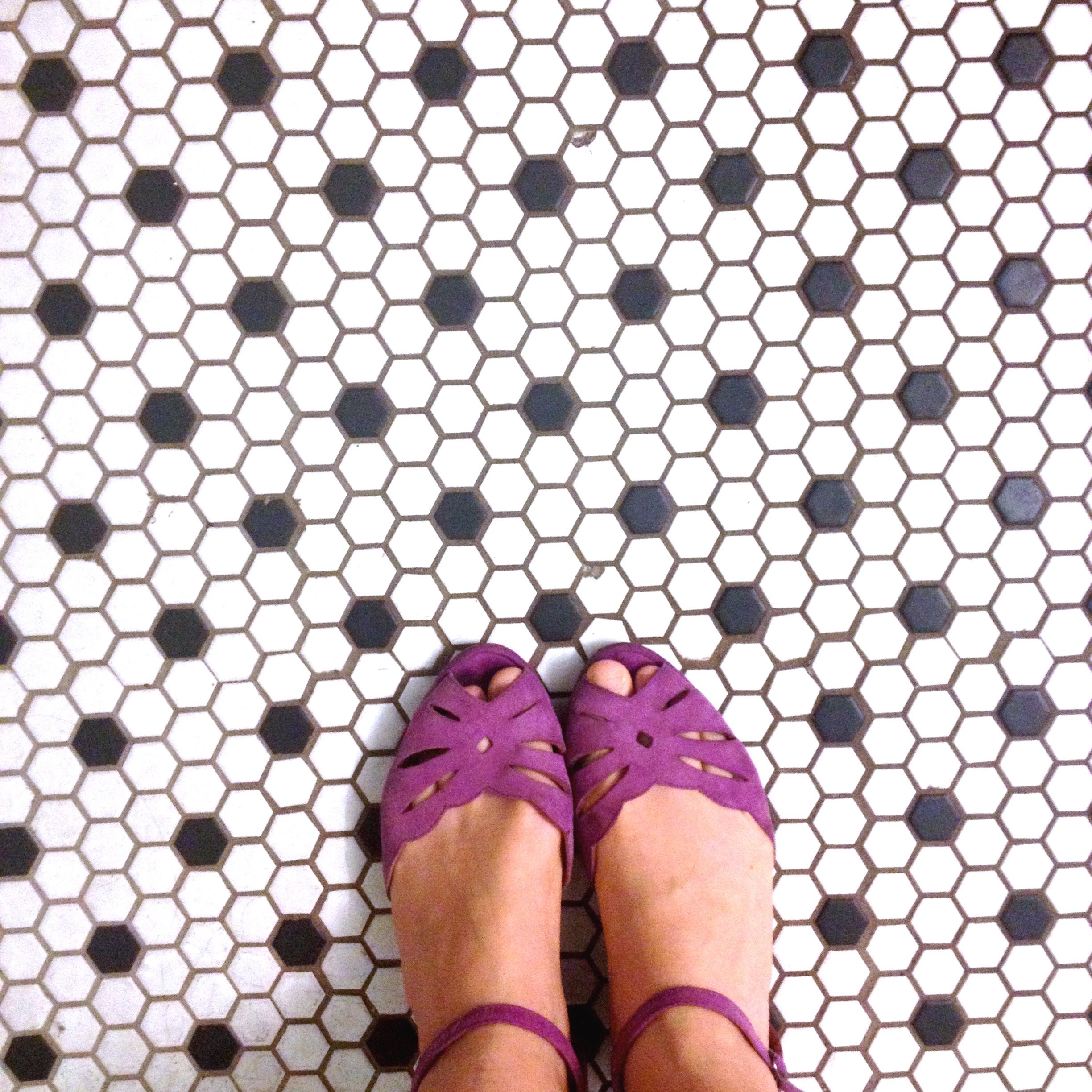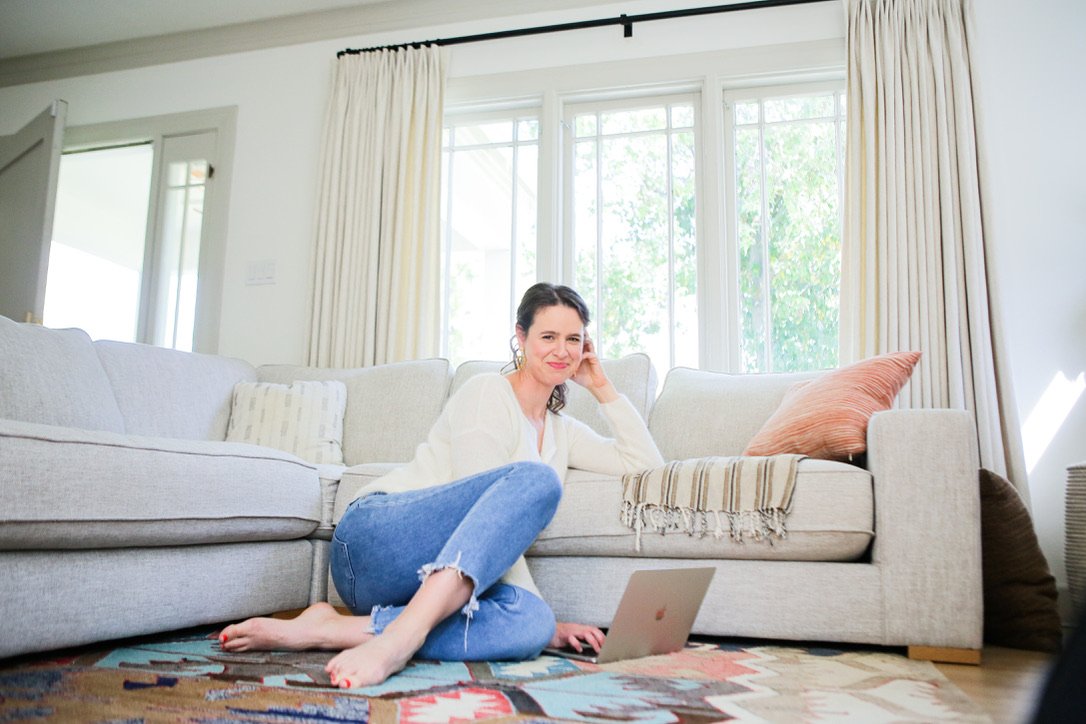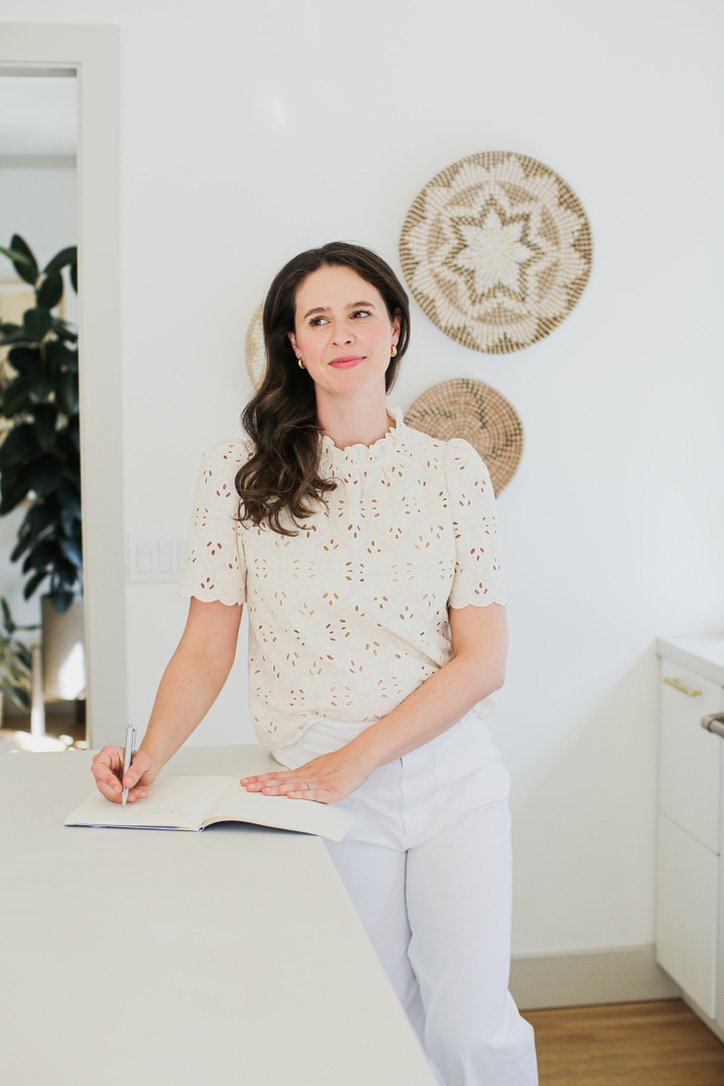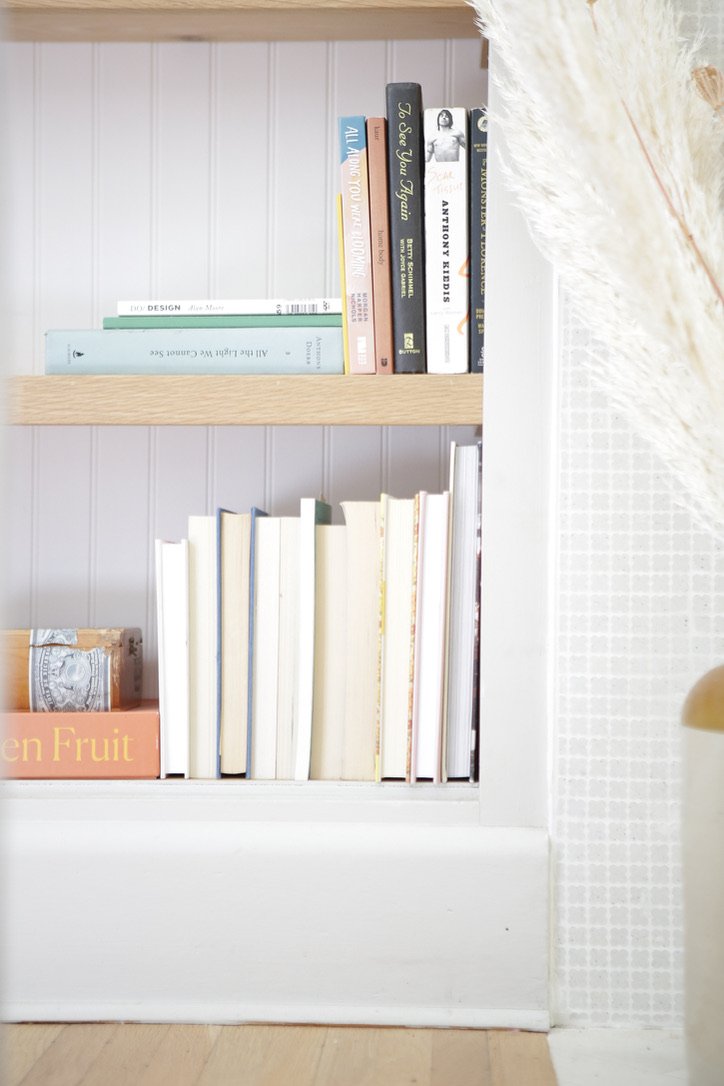Blog
How to reconnect with your inner compass (Part I)
Remember how I said I wanted to talk about your compass + your engine this month? I thought we could start with the compass — that part of you that tells you what direction to go in life (since your engine isn’t that useful, if you don’t know what direction to go.)
So here’s one reminder:
The more you do use your compass, the easier it is to use.
Your compass — which we could also call your authentic truth, your knowing, your sense of “right”-ness — is like a muscle. The more you use it, the easier it is to use.
Ask a professional ballerina to lift her leg above her head – and she can do it immediately, and with ease.
Ask me to do it, and I can’t. I’ve spent almost no time building that muscle – it’s not strong enough, and the connection between me and my leg isn’t strong enough.
The more often you get in touch with your truest desires — about anything, including what you want to eat for dinner, whether you like that water bottle, or how you actually feel about your office mate — the easier those desires will be to hear about the more complex, thorny, subtle parts of life.
And the opposite is also true. The less you listen to your sense of truth, or authenticity, or right-ness, or whatever you want to call it — the harder it will be to hear.
…
Part of my job as a coach is to give my clients exercises to build their own know-your-true-desires muscles.
If you’re interested in doing a little muscle-building this month (a fascinating exercise to do especially around the holidays), here is one of the most common versions I give to my clients:
Strengthening your ability to listen to your yeses and no’s
Typically, I will just focus on either yeses or no’s – so pick one. For whichever one you choose:
Start by remembering what it is to feel a “yes” or a “no.”
Think of at least one time in your past when you felt a visceral, full-body yes or no –an 8 or a 9 on a 10-point scale.
Maybe it was walking into the house you eventually bought (a “yes!”), or when you dragged yourself to your job that you hated (a “no”)! Maybe it was the last time you went out with that boyfriend, when every part of you knew it was over (a “no”) — or when you realized you loved your wife (a “yes”).
The point is to re-remember what that physical sensation was like, so you can recognize it for step #2.For the next week, track your yeses or no’s.
Keep a running list, for the next 7 days, of every single yes (or no) you feel, plus some small notes about what the physical sensation in your body was like (“I felt a closing in my chest,” “my belly felt tight,” “my back felt expansive.”)
Many of these will be silly, trivial yeses or no’s. You might feel a yes (or no) about what shoes you’ll wear, about bedtime with your kids, about cleaning up your office.
But they are important – they are strengthening the muscle of listening, so you have it when you most need it.
…
I’m just going to say it again:
Your connection with yourself — with your authentic truth, your knowing, your sense of “right”-ness — is like a muscle. The more you use it, the easier it is to use.
Happy Know-Your-True-Desires Month, everyone ☺
As always, I’m rooting for you in the week ahead. You’ve got this.
Katie
p.s. Would you like to work with me 1:1? Here's what one past client said about her experience:
“I feel like I'm a lighter, happier version of myself and a better partner, friend, and coworker than I was a year ago (my boyfriend outwardly agrees to anyone I say that to).”
Learn more here.
Want to receive essays like this every Sunday morning? Sign up for my newsletter!
Back to the basics: Your engine + your compass
I’m not a big New Years Resolution-type. It never made sense to me to set splashy goals in a season when I typically just need a good veg on the couch.
Instead, this January, I thought it could be fun to return to some of my core concepts — the things I tell clients day-in, day-out. The basics we all need.
For today: Let’s talk about the two things you absolutely cannot do without, to have a life that works for you:
An engine
A compass
A compass is what tells you what direction to go in. And an engine is what actually takes you there.
You need both.
If you have an engine but no compass, you can be driving around all day (or all decade), but it never quite feels like where you truly want to be.
If you have a compass but no engine, you know what you want but cannot freaking make progress towards it.
Typically, if someone finds their way to me, they’ve got an issue with one or both.
(If it’s both, I tend to treat the compass first, because there’s no use in having a functioning engine if you exhaust the car driving in random directions).
In the next few weeks, I’ll give a couple of ideas on helping you with both your Compass + your engine, but two questions + two ideas to start us off right this new year:
Question: Which of these do you tend to rely on more? Your compass, or your engine?
Idea: It could be an interesting experiment, this January, to let yourself give your dominant mode a rest, and let the other take the wheel for a bit. Compass-dominant people might have a really powerful month of checking in with themselves less, and powering forward. Engine-dominant people might have their minds blown if they slow down for a bit and really get directionality right.Question: Is any of these completely broken and needs to be taken to the mechanic to be repaired, or completely revamped?
Idea: If so, what would your “mechanic” be? A game-changing book? A podcast? A conversation with an insightful friend? A therapist or a coach? Here’s more about working with me, if you’d like.
…
As always, I’m rooting for you in the week (and year) ahead. You’ve got this.
Katie
p.s. Ready to work on both your compass and engine in 2024? I’d highly recommend working with me 1:1. Learn more here.
Want to receive essays like this every Sunday morning? Sign up for my newsletter!
People who are good at everything + their common problems
Some percentage of people who work with me are what I call “People Who Are Good at Everything.”
People Who Are Good at Everything are not good at absolutely everything. But they are often excellent in at least a few of the following ways:
Their bosses love them
They get great feedback at work
They are skilled in sports and/or the arts
They were excellent students
They are charming and charismatic with new acquaintances
Many people want to date them
Of course, there are clear advantages to being someone who is Good at Everything.
And yet, I have also noticed as a coach, that some (though not all) People Who Are Good at Everything develop a common problem.
It’s this: They forget how to know what they want.
…
We might assume that People Who Are Good at Everything would be excellent at knowing what they want. After all, they have so many amazing options to choose from — whether that be jobs, girlfriends, or colleges.
And yet, I have observed that some People Who Are Good at Everything can become quite disconnected from what they want, for at least three reasons:
They become addicted to being appreciated and adored.
Several of my clients who are Good at Everything have excelled at jobs that they didn’t particularly like anymore. It was hard to leave, because they were getting such great feedback from their bosses and colleagues and clients. Everyone adored them! They were killing it!
I’ve also witnessed someone who was very good at getting boyfriends to adore her, who stayed for months and sometimes years in relationships in which she didn’t adore the boyfriend. It felt so good to be adored!
Of course, positive feedback is important. But also, we can become over-reliant on it, to the point that we value them-liking-us so much, we forget about the importance of whether we like them.They are particularly susceptible to valuing impressiveness over their personal truth.
This is not to say that the impressive choice is never the right choice – sometimes it is! But for some People Who Are Good at Everything, their default becomes to just pick the impressive choice — because it is elite, because other people want it, because they can.
When we, over and over, default to picking the impressive choice without deeply inquiring about whether it is authentically right for us — our ability to even know what we want can atrophy…because we’re not using it.They can be unaccustomed to the discomfort of going after something that they want.
Sometimes, People Who Are Good at Everything can get accustomed to things coming easily. They are used to a lot of positive feedback, and a lot of great options.
But what they authentically want might require seeking out something that is not currently choosing them — they might have to go out there and get that job, relationship, or opportunity. They might face uncertainty on that journey, and come up against rejection and failure many times. This — to put it mildly — can totally suck.
For people who are not Good at Everything, well, this is just how life is — you gotta go after what you choose, things often don’t choose you.
But People Who Are Good at Everything sometimes lack those calluses, those muscles. They sometimes think that if something isn’t choosing them right now…it’s not meant for them.
But that isn’t necessarily true. It can just be that going after what you want can be really tough.
…
I wanted to share this concept because I suspect that many of you reading this are also People Who Are Good at Everything.
You don’t have to be a supermodel or a Heisman Trophy winner to be someone who is Good at Everything. You could be like this in only your professional life, or only your romantic life, or only in your friendships.
It has been empowering for my clients to hear that there are a specific set of problems that sometimes come along with being this type of person.
And, of course, while solutions are always deeply personal, there are also some common themes:
Re-remember how to know what you want, and how to be with the discomfort of the journey. Make sure your compass and engine are strong.
Reach out for help and support if you need it – I’d highly recommend working with me 1:1, if you’re feeling intrigued.
As always, I’m rooting for you. You’ve got this.
Katie
p.s. One of my clients who recently finished working with me wrote:
""These are lessons that I could potentially have learned ""on my own"" after another 1-2 decades of life experience, but the fact I have made such progress in 12 months means that working with Katie has easily been the best investment I've made in myself in my adulthood.""
I feel so moved by her saying that. If you'd like to work with me — I currently have two openings for new clients — learn more + reach out here.
Want to receive essays like this every Sunday morning? Sign up for my newsletter!
My parenting role model
Back in 2019, I read my favorite parenting “advice” essay of all time.
I was not a parent.
I was not even pregnant.
And yet, it inspired me as a human being. And now that I’m a parent, it inspires me even more.
The essay was called “My Mom was a Fast Food Cook”, and it was written by Mindy Berry Walker, who is now a mom with kids of her own, about her childhood in the 1970’s.
Walker’s mom, Mrs. Berry, was a full-time teacher, with three kids, who also played tennis nearly every afternoon after teaching.
Just let that sink in — especially if you’re a parent.
Full-time teacher.
Three kids.
Tennis every afternoon.
How did she do it? Well, in Walker’s words, “it probably helped that she didn’t have to rush home to prep dinner.” The family ate fast food most nights.
Chinese food, Italian, burgers – in their small town 70 miles south of St. Louis, there weren’t even that many options in the late 1970’s. It was a huge upgrade when a Taco Bell came to town and they could get Mexi-Melts.
Here’s what Walker said:
“I didn’t think much about my childhood dinner routine until about a year ago when I was out with fellow over-worked, over-stretched friends, and we were discussing the impossibility of finding time to exercise.
“I mentioned that my mom had played tennis nearly every afternoon after teaching when I was growing up. “How did she squeeze it in?” they asked.
“I explained it probably helped that she didn’t have to rush home to prep dinner. Brows furrowed in question. But the audible gasps didn’t come until I said, “And she never felt guilty about her choice! I never heard my mom say, ‘What’s wrong with me? I should cook more.’”
Oh man, I feel relaxed and frankly, delighted, whenever I hear that story.
Walker says that she’d like to think not cooking dinner was some fabulous form of 1970’s feminist protest, but ultimately, she thinks that her mom just didn’t like to cook. “She didn’t find it relaxing or rewarding to “have something in the oven.” Her own mother didn’t get satisfaction from making meals, and she didn’t encourage my mom, or any of us, to take it up.”
And, in fact: “Once she decided that she could be a good mom—the best mom, I’d venture—without being on stovetop duty every night, and that she and my dad were okay with the cost, the routine was set.”
Personally, I think of Mrs. Berry often. I love that she knew her priorities — fun exercise trumped cooking — and she freaking followed them.
…
So, today, I thought I’d share it with you:
In what area of your life could you be better (a better parent, employee, friend, spouse) — by letting yourself follow your truest priorities, and not feel guilty?
What about your life could you ask: What would Mrs. Berry do?
…
As always, I’m rooting for you in the week ahead. You’ve got this.
Katie
p.s. For some of you, there’s a big, ahem, holiday tomorrow. What do you think Mrs. Berry would do about that day?
p.p.s. Would you like to work with me 1:1 in the new year? Here's what one past client said about her experience:
“I feel like I'm a lighter, happier version of myself and a better partner, friend, and coworker than I was a year ago (my boyfriend outwardly agrees to anyone I say that to).”
Learn more here.
Want to receive essays like this every Sunday morning? Sign up for my newsletter!
Lessons from a pediatric neurologist
One of my sons has epilepsy, and has taken five different medications over the past few years.
Each time we try a new medication, his pediatric neurologist (who will be sainted after she dies, I’m pretty sure) discusses the range of medication dosage with me and my husband.
And then, every time, she says: “But we should start at the minimum viable dose.”
In other words: If my son could take between .5 and 2 mL per kg of bodyweight, let’s start at the bottom and only increase if necessary.
Greater dose, most people agree, comes with more side effects.
So start with the minimum viable dose.
One of my consistent observations as a life coach has been: Most of us do not start at the minimum dosage.
Of course, this observation is not new. We take on too much, we exhaust ourselves, blah, blah, blah.
But recently, I’ve had a new insight about it: Many of us lack the imagination for what a minimum viable dosage *could* be.
…
Here’s the thing: my son’s neurologist knows, for a fact, the range of suggested ml/kg of body weight that can be effective. For most of the medications my son has taken, it’s typically already been established in the research literature.
For us in the non-medical world, I think part of the problem is that we *think* we’re doing a small dose. We think 30 minutes a day of exercise or writing or journaling, for example, is doable and sustainable — while also being efficacious towards our goals.
But what if that’s nowhere near the minimum viable dose?
One of the great joys of working with my 1:1 clients, is that from my experience and skill, I can give them outrageously doable assignments that nonetheless help them achieve their goals. But today, I just want to offer that idea for you to chew on:
“30 minutes a day” might become “30 minutes once a week.”
“Actually do three things this week” might become “Just make a list of three things you could do, this week.”
“Take the next key step” might become “identify the next key step, and just think about it each day this week.”
Over and over and over, my clients make more progress with me than they would on their own. There’s many reasons for that, but think it’s not so dissimilar from what my son’s neurologist knows:
With greater dose, comes more side effects.
I keep the dose quite low, minimize side effects, and my clients are better able to reap the positive effects of the “treatment” (to use that medical metaphor.)
…
So I would offer you this week: How could you significantly lower your dosage?
In my clinical experience, it still might be quite potent.
…
As always, I’m rooting for you in the week ahead. You’ve got this.
Katie
p.s. The most successful people in the world have coaches — from CEOs to Olympic athletes. Which makes sense; successful people get that way by being open to discovering blind spots, re-examining old beliefs, and trying new things.
Why not you?
If you'd like to work with me 1:1 — learn more here.
Want to receive essays like this every Sunday morning? Sign up for my newsletter!
One thing that often holds my clients back from making decisions
Remember how we talked about confusion last week? I wanted to add a quick additional note (something I tell clients all the time):
Sometimes the reason we are mired in the Land of Confusion is because we are not yet ready to take action.
If we took action…
We might have to find a new job.
Have a really dicey conversation with our mom. Or our boss.
Get divorced.
Move.
Do something that our friend wouldn’t like.
Make some tough financial choices.
So here’s a reminder:
You can know the explosive, scary, radical thing… and not take action until you are ready.
You can know the explosive, scary, radical thing… and not tell a single soul yet.
You can know the explosive, scary, radical thing… and keep your life exactly the same for as long as you want.
But just knowing it — clearly + explicitly, within your own heart + mind — it will make you feel calmer, more grounded, stronger.
It will help you.
And you can wait as long as you freakin’ want to actually move forward.
…
As always, I’m rooting for you in the week ahead. You’ve got this.
Katie
p.s. Interested in working with me for new 1:1 clients? I have a few spots open for new clients. I’m a skillful, experienced coach, and there is nothing that I love more than blowing my clients minds about what’s possible for them. (I know that’s cheesy, but it’s true.)
Learn more about working with me here.
Want to receive essays like this every Sunday morning? Sign up for my newsletter!
On confusion + not knowing what you want
Recently, several of my clients — all in very different situations — were confused.
Confused about what they want next in a job.
Confused about how to find more time, as a busy executive.
Confused about whether to continue in an unconventional relationship.
They told me the same thing: I don’t know what to do! Maybe finding an answer is impossible!
But with a bit of poking, a lot of listening, and some key coaching tools, it became clear: they did know what to do.
Of course, once they knew what they wanted... they had some other problems: fear, guilt, uncertainty.
If they know what type of job they want, will they be able to find it?
If they know what they need to cut from their schedule, will someone be mad? Or judge them?
If they continue in an unconventional relationship, will they get hurt?
These are not insignificant problems. These are clutch-your-heart problems, take-deep-breaths, make-sure-you-manage-your-anxiety problems.
But here’s what I told them: in almost every situation, it is typically better to at least know your true desires and opinions, rather than be “confused.”
Knowing your true desires doesn’t necessarily mean you’ll get what you want.
And knowing your true opinion doesn’t mean that other people won’t judge you for it, or that you’ll never encounter unintended consequences.
But you’ll have to face the fear and uncertainty and potential judgement whenever you figure out what you want – so you might as well move onto that phase sooner rather than later.
…
For many of us, we feel lost in confusion, when actually, we are capable of knowing what we want and believe.
Is knowing what we want and believe the end of the road? Heck no.
But least spare yourself the suffering of “confusion.”
At least tell *yourself* the truth.
As always, I’m rooting for you. You’ve got this.
Katie
Want to receive essays like this every Sunday morning? Sign up for my newsletter!
My intentions: Holiday burnout edition
Thanksgiving is done, December lies ahead.
Whew.
If you’re anything like me, you might not need more “self development ideas and insights” in this exact moment. You might feel a little full-to-the-brim with a combination of turkey, pecan pie, and social plans.
So instead, I wanted to ask: what are your intentions for December?
When I close my eyes, take a deep breath, and really answer that question, here’s my honest answer: I want to take good care of myself in December.
My life has been — shall we say — energetically expensive this year (actually, the past two or three years, but who’s counting?). I’ve been saving as much energy as I can, but the “energy bill” is coming in high nonetheless.
If I’m being honest, I felt some grief that “take good care of myself” was my honest intention for December.
I would have preferred a more “glamorous” answer, like:
Really enjoy the holiday season!
Make tons of holiday memories!
Go sledding and have an incredible birthday party and really decorate for Christmas!
But my honest answer remained the same: I want to take good care of myself this month.
And look, holidays will be had. I’m excited to light a menorah with my 3-year-olds, to decorate a tree, to make Christmas cookies.
But also, I’m purposefully keeping things simple:
I’d like to eventually have more holiday décor for our home, but I won’t be buying it this year. #I’vemadeenoughdecisionsalready
My birthday is in December, and I often enjoy a party with friends, but this year will just be a small, family dinner.
We’ll probably wait to make Christmas cookies until the new year. (Hey, chocolate-dipped shortbread also tastes delicious on January 1!)
I wish I had more “glamorous” intentions… but I don’t. Yes, I feel some grief about that — but I also feel profound gratitude towards myself, for listening so carefully to my deepest desires.
…
I share this personal note, not because you care when I make chocolate-dipped shortbread cookies — but with the hopes that it gives you permission to honestly acknowledge your most authentic intentions.
Whether you want to play or hibernate, grow or contract, connect or fall apart – I hope you’ll give yourself a loving ear, and follow what you hear.
What are your intentions for December? I’ll be rooting for you.
Katie
Want to receive essays like this every Sunday morning? Sign up for my newsletter!
An alternative to “thriving”
One of my jobs is to help my clients develop a vision for their lives (and sometimes nudge them towards visions bigger than they would create on their own).
As part of that work, we frequently discuss the idea that “ok” is not what we are striving for.
I mean, “ok” is awesome. It’s amazing. In some seasons, it’s something that feels far off in the distance, a desert mirage. But also, if we’re always settling for “ok,” we may feel ourselves yearning for more.
But the question then arises: What are we shooting for instead?
For at least some people, a word like “thriving” feels like… too much. Too far off, too distant, too… impossible. Have you ever felt that way?
For folks in that position, a word like “balanced” can be much more useful + inspiring.
When we start to explore the “balance” question, many of my clients realize: oh yeah, all I do is work and spend time with my kids.
If you don’t feel as good as you’d like, I can almost guarantee you aren’t balanced in a way that you have intentionally chosen, between work, rest, kids, partner, friends, family, hobbies, spirituality, and health.
Being unbalanced can be okay — and may be a necessity — in some seasons of life. But if you do it in the long term, eventually you start to feel hallowed out from the inside.
In a 1:1 coaching engagement, the whole point is to identify the problem — like a lack of balance — and then, together, actually change the situation. (If that’s of interest to you, learn more here.)
But for this weekend, I wanted to offer you some questions to ask yourself:
1. Does “balance” resonate with you as a goal?
2. In what areas of your life do you feel out of balance? Often these are areas like creativity, connection, rest.
3. What is one thing you could do for 15-20 minutes today, to feel more balanced?
As always, I’m rooting for you. You’ve got this.
Katie
Want to receive essays like this every Sunday morning? Sign up for my newsletter!
Why I don't necessarily recommend hiding your anxiety, insecurity, or fear
A question for your weekend:
What would you gain if you let them see you accurately?
So many of us are holding up facades — facades that prevent the world from seeing our anxiety, our insecurity, our imposter-ness.
But what if you just... let other people see? I know it's a big ask, and perhaps one that is scary or complex to implement.
But the rewards are big, too. On a personal level, my coaching got a lot better when I decided to just let my clients see that sometimes I was nervous or unsure. In fact, I think I seemed a lot less nervous or unsure when I wasn't also trying to hide that from them.
And, perhaps even more importantly: it was so much less tiring. Holding up a facade takes an enormous amount of energy. You may have forgotten how much energy it takes if holding it up is your life-as-usual.
How much energy would you get back if you just let them see you accurately?
As always, I know you’ve got this.
Katie
Want to receive essays like this every Sunday morning? Sign up for my newsletter!
Want to do a Q&A?
This week, someone emailed me for advice about a big career decision. I sent her back a few thoughts, and she sent me back the sweetest email – she was so grateful, and it seems that it made a big difference in the final decision she made.
It occurred to me: I bet you some questions that you’d love some guidance or ideas on.
I typically only provide email coaching for my 1:1 clients. (This week’s email was the exception, not the rule!) But I’d love to answer some of your questions on my podcast, Now We’re Getting Somewhere !
Maybe you have a very specific question you’d like me to cover?
Or a more general topic that you’re struggling with?
I actually think it’s a generous thing to submit a question — if you’re struggling with something, there’s probably many people who are struggling in the same way, even if the particulars are different.
You can submit a question here.
…
As always, I’m rooting for you in the week ahead. You’ve got this.
Katie
p.s. As you get this, I will be midway through my 20-ish hour journey with toddlers to visit my in-laws and Portugal. On this, of all weeks, won’t you please also root for me?
What I tell clients who struggle to take breaks
Here’s something I’ve been saying to seemingly all of my clients recently:
“What if you feel like garbage when you do it…
…and *nothing* is wrong?”
We may know that we need to close our laptops at 6 pm so we can rest + rejuvenate…
Or stop accepting meeting requests from that low-priority project…
Or walk our dog in the middle of the day so we can clear our heads and come back mentally sharper…
… And we may feel like absolute garbage when we do it.
Jumpy in our bodies.
Minds racing.
Worried that we are making a terrible mistake, or that someone will be super mad at us.
This is a tough situation. These actions (closing the laptop, turning down the meetings, walking the dog) are supposed to make us feel better. Is something wrong, if they make us feel absolutely terrible?
The answer is clear: No.
No, nothing is wrong. In fact, it's completely normal to feel like absolute garbage the first 5 times we do something that is hard + scary + out-of-the ordinary for us.
Of course, we can take action to feel less jumpy or mind race-y (see also: journaling, lying on the floor). But even if we do all the positive personal development in the world, it may still take at least 5 times, or 10 times (and occasionally more), before our nervous system + our mind calms down enough for us to reap the full benefits of those activities.
What if it could feel terrible and garbage-y… and nothing could be wrong?
…
As always, I’m rooting for you in the week ahead.
Katie
p.s. Would you like to work with me 1:1? My clients do higher quality work with less time and effort, change careers, finally write that screenplay, make more money, cultivate deeper friendships, and improve their marriages.
And, even more importantly, they feel: clearer about their paths and their values, more confident, more satisfied, and like they have more energy, calm, meaning, and joy.
Learn more here.
Want to receive essays like this every Sunday morning? Sign up for my newsletter!
Who do you become when you’re awkward? (A personal story)
I started taking tango classes last July. My weekly classes have felt profoundly nourishing for so many reasons: The dancing! The thinking with my body-not-my-mind! The shoes!
And another reason is that it’s put me into contact with a bunch of adults I’ve never met before, who are just there to have fun + learn.
The minimal chit-chatting before class, after class, and between dances has been nourishing in a way I didn’t expect. It turns out that after COVID, working as a solopreneur, and having young kids, I haven’t been making that much chill, friendly adult chit-chat anymore.
And yet, I’ve also noticed that I often feel mildly awkward, in these social interactions with people I don’t know.
And when I’m awkward, I get jokey.
I smile extra big.
I make more jokes.
I take every interaction as a possibility to be playful.
Truthfully, from the outside, it probably just seems like I’m a friendly, fun person.
And I am a friendly, fun person. That’s a true, real side of me.
But also: my playful, jokey side is something I lean on and escalate, when I feel awkward. And when I turn up the volume on my jokiness, I miss out on the chance to have a slightly deeper, slightly more authentic interaction.
…
A short aside about authentic interaction: it’s not that I expect to have the deepest conversation of my life while everyone is changing shoes after tango class.
But I do believe that there can be a subtle difference in the quality of conversation when I am present with myself and others, and choose to share something from my in-the-moment, direct experience.
Even if the conversation is still playful and fun, even if jokes are still made, it also feels… deeper, richer, and more connecting.
More thoughts on that here, if you like.
…
Noticing this about myself made me think of many of my clients, who all have their own crutches when they feel awkward:
One client gets extra sassy and sarcastic.
Another starts leading the conversation, sharing a lot of funny and interesting stories about herself.
Another defaults to listening — asking amazing questions, but sharing very little about herself.
Each of these crutches reflects something true about my clients — they are hilariously sarcastic, a dynamic storyteller, or an incredible listener, respectively.
But also, each of them can tell when they are turning up the volume on this quality as a crutch. And they can all tell that this crutch is causing them to lose out on the opportunity for more authentic, deeper connection.
…
I think the process for shifting from our personality crutches to more authentic interaction happens in three stages: after, before, and during.
Here’s how I’m trying to apply it to tango:
1. After
In the beginning, you’ll probably only be able to even notice that it’s happening…after it has already happened. I think the first step is just noticing: wow, I was kind of relying on that thing that I do when I feel awkward. I would like to show up a bit more authentically next time.
2. Before
Next time, before that kind of social interaction, you might set an intention. I’m going to say to myself: I’d like to show up a bit more authentically and present next time, instead of just defaulting to trying to say something funny.
3. During
I’m going to try remind to myself, 1-2x during tango class: to breathe, and to stay in my body. (Often when I feel awkward, I become just a floating head who is trying to say something funny and interesting.) At those times, I’ll try to repeat to myself: It’s okay to feel awkward and It’s okay for them to *see* you feeling a little awkward; you don’t have to hide it.
And then, also, I want to try to find opportunities to say something true, instead of something purely jokey, even if we’re just talking about something simple like how hard it can be to find time for hobbies when you have kids.
…
I wonder: what is your personality crutch when you feel awkward?
This week, you might notice where it shows up, and consider turning down the volume a bit to let your more authentic self show.
As always, I’m rooting for you.
Katie
Sign up for my newsletter to get helpful + encouraging essays like this every Sunday morning. It’s free!
3 ideas for how to get your energy back
Here’s something I’ll go to the mat for:
The most important thing you can do each day is managing your energy effectively.
Nothing else in your life will get done effectively, if you don’t have enough energy. And seemingly, unrelated things — procrastinating, struggling to know what you want in life, struggling to focus, for example — are often tied to a lack of energy.
I think that this problem is — quite frankly — at the level of a crisis.
It’s a crisis for the people who are exhausted, most of the time.
It’s a crisis for their partners, their friends, and their kids — who never get to experience them when they’re not exhausted.
And it’s a crisis for the world — for the great things they will never do because they are too exhausted.
I want to tell you three things that I passionately believe about managing your energy effectively.
1. You have agency.
2. Planning out on what and when you’ll work has a pretty insane ROI.
3. Stop burning $100 bills in the fireplace.
Let me say more about each of these:
1. You have agency.
Many people believe that more energy is simply not possible for them. I have kids/a busy job/so many responsibilities. I just need to keep pushing for the next year or so.
Of course, life circumstances do contribute to you having limited energy. And, of course, systemic issues do, as well.
But also: You are contributing to your lack of energy. You are likely contributing far more than you think.
Here’s how I know: I have never found a 1:1 life coaching client who I couldn’t help find more energy (and time), if it was something that they wanted. Did it sometimes require thinking creatively or making some tradeoffs? Sure. But those tradeoffs were always net positive for them.
2. Planning out on what and when you’ll work has a pretty insane ROI.
Planning “on what” you’ll work means being very clear on: What are actually the 1-3 most important things for you to accomplish at work, today?
Planning “when” you’ll work means literally deciding: when will you do this? Typically, this means looking at your calendar each morning (or the night before), and identifying blocks of uninterrupted time (no checking email!) when you can make meaningful progress.
Both of these activities require unflinching honesty:
How long will it actually take you to do that task? (Not how many will it take in a dream-rockstar-productivity world. But how long with it take your real, human, sometimes-sensitive-and-tired self take?)
How many hours a day, and how many minutes in a row, can your brain actually do challenging work? (Ditto the above. Plan for your real, human, sometimes-sensitive-and-tired self.)
For most of us, things take longer, and we have less capacity to work, than we’d like to imagine.
And yet, the results from that honesty, planning, and undistracted execution are astonishing. It is the only way to work less while getting higher-quality work done. And isn’t that what we all want?
3. Stop burning $100 bills in the fireplace.
Many of us chronically over-tired folks act like people with $10,000 of credit card debt who also burn $100 bills in the fireplace every night “for warmth.”
Your nightly 2-hour Instagram or YouTube habit? The way you check your email every 15 minutes? It is making you more tired.
And yes, this issue is complex. Sometimes we’re so tired that we feel that we need that little jolt of dopamine to get through our exhausting lives.
But I need to be honest with you: overall, you are making yourself more tired.
You simply can’t afford to leak energy like this.
To be clear: I’m not an advocate of going cold turkey on tech usage. For most of us, that just doesn’t work. But even small actions can make a difference. And it’s not just technology! Most of us have other things that are leaking our energy as well.
But it's worth it to answer the question with unflinching honesty: What are the obvious things that I’m doing, that are like burning $100 bills in the fireplace?
…
Sometimes, when our brains are chronically tired, it’s hard to remember: wait, how do I get less tired?
So here’s a reminder:
1. Remember that you have agency. You can find more energy. It’s possible.
2. Remember that planning out on what and when you’ll work has a pretty insane ROI. Just decide what matters most + when you’ll do it, each day. Being reactive with your workday is a recipe for working far more hours than you truly need to.
3. Stop burning $100 bills in the fireplace. You are likely making yourself more tired. See if you can reduce some of those activities to get your energy back.
And above all, please know that I’m rooting for you in the week ahead – and always.
You’ve got this.
Katie
Sign up for my newsletter to get helpful + encouraging essays like this every Sunday morning. It’s free!
Does everyone around you *also* work too much?
One of the biggest causes of exhaustion and burnout is…everyone else at your job.
You might want to stop at 5:30 pm…
You might want to take a real lunch break away from your computer and IM…
You might want to go to fewer meetings, or make your meetings shorter and more efficient…
…but if everyone else at your job is working late and on weekends, staying constantly active in their email, and bloating your calendar with meetings…it can feel impossible to do anything differently.
Here’s the thing: You need to know other people who are doing things differently.
We’re pack animals. We’re creatures of community. We are constantly watching those around us, and taking our cues from them.
Of course, learning how to think for ourselves is an important skill.
But if you’re trying to do something that’s hard…why not just make it easier?
Why not find a community that shares your values + your actions?
…
In 10 Hours Back, you’ll meet 9 other warm, deep, insightful folks — who are also committed to doing excellent work… while having more time + energy for everything else that they value.
Sharing values with 9 other people, doing the same exercises and homework, and getting coached with 9 other people — it sets you up for success. And not just success — it sets you up to enjoy the process — because you will fundamentally know that you’re not alone.
When you’re leaving earlier, and noticing that everyone else at your job is still at your desks (or still active on IM), and your chest feels jumpy...you’ll have this community.
When your coworker makes a comment that lets you know that he… noticed… that you left earlier than usual…you’ll have this community.
You’ll have emails in your inbox, every day, from them, sharing how they’re doing, what they’re loving, and what they’re struggling with.
You’ll have their vulnerability, and their courage, as they share in our sessions what’s working for them — and what felt hard.
You’ll see them get coached on something you haven’t yet had to face – so later, you’ll be able to do it, too.
…
Haven’t heard of 10 Hours Back? It’s my small group program starting in May — I’ll be helping a small group of professional implement doable, practical changes to reduce their workweeks by 10 hours — without sacrificing quality.
I’ll open enrollment to the 10 Hours Back waitlist first, starting on April 1 — and there are already more people on the waitlist than spots in the group. So if you’re interested…get on that waitlist!
You can learn more + sign up for the waitlist here.
…
As always, I'm rooting for you.
Katie
p.s. My small group program, 10 Hours Back, includes the following:
12 group coaching calls to help you get 10 hours back from your workweek
Client portal, including a simple curriculum, exercises, replays, and additional resources
Weekly email support in between coaching calls to maximize results
Final 1:1 Planning Call so that you have exact steps on how to continue this work after the program ends
The investment is $5k, with payment plans available. In the first 30 days, you’ll have clear ideas on how to shave time off your work calendar, and will introduce more meaning + joy into your personal and professional life.
Here’s the link to sign up for the waitlist.
“But I want to be a team player!”
Typically, when I ask my clients how to reduce their working hours, they have at least a few ideas.
There are some meetings I could say “no” to.
I could take a real lunch break — which I’m actually allowed, in my contract, to take.
I could delegate better to the people who work for me.
Of course, I have even more ideas for them — but it’s not like they have no idea where to start. It’s that they can’t bring themselves to actually implement those ideas.
In other words – the biggest problem isn’t the how. It’s the why. There are usually nuanced, personal reasons why they haven’t implemented those actions to reduce their hours:
A few, for recent clients, include:
“I’m afraid of letting something slip.”
“I want to be a team player.”
“I deeply care about my organization’s mission — I don’t want to be selfish or self-serving.”
Look, if you believe that it’s a choice of being a team player or 10 hours back…I get why you’d often choose to be a team player! Ditto for letting something slip, or supporting your organization’s mission.
Here’s the magic of 10 Hours Back: I will help you reduce your hours, while being less likely to let something slip, being more of a team player, and more invested in your organization’s mission.
Yep, I mean it.
When you're fresh, well-rested, and mentally sharp, you are able to identify + efficiently address the most important tasks, help your colleagues in the highest value-add way, and do the creative + cognitively challenging work your organization truly needs.
In 10 Hours Back, I’ll be teaching a 4-part model to help you use your brain at its most efficient and effective — so you can cut hours without worrying about letting others down.
On our 90-minute coaching calls, I’ll coach you on your specific fears and hesitations — so you can actually implement these changes and not let anxiety hold you back from doing what’s best for you, your team, and your organization.
Everyone benefits when you get 10 Hours Back.
…
I’ll open enrollment to the 10 Hours Back waitlist first, starting on April 1 — and there are already twice as many people on the waitlist as spots in the group. So if you’re interested…get on that waitlist!
You can learn more + sign up for the waitlist here.
…
As always, I'm rooting for you in the week ahead. You've got this.
Katie
p.s. My small group program, 10 Hours Back, includes the following:
12 group coaching calls to help you get 10 hours back from your workweek
Client portal, including a simple curriculum, exercises, replays, and additional resources
Weekly email support in between coaching calls to maximize results
Final 1:1 Planning Call so that you have exact steps on how to continue this work after the program ends
And more surprises!
The investment is $5k, with payment plans available. In the first 30 days, you’ll have clear ideas on how to shave time off your work calendar and will be able to introduce more meaning + joy into your personal and professional life.
Here’s the link to sign up for the waitlist.
Announcing: 10 Hours Back
Today’s announcement is for you if you’ve ever wanted more hours in your week.
If you’ve ever thought I’d love to find a way to work 10 fewer hours at my job, so I could have more time + energy for my… life.
Well, today, I want to offer it to you.
Literally.
Today, I want to announce 10 Hours Back.
(!!!!)
In 10 Hours Back, I’ll be helping professionals reduce their workweeks by 10 hours – no matter their work culture, industry, or boss. It’s a 4-month, small-group coaching program.
That’s such a radical, wild, fabulous idea, that I just want to say it again: I will be helping a small group of professionals reduce their workweek by 10 hours.
10 hours back. Per week.
…
Too many of us are chronically too tired, too busy, and too stressed. And a big part of the reason is that we work… a lot.
But too often, it just feels like this is what it is to be a working adult. I mean, isn’t that what your colleagues, your best friend, and your college classmates are also doing? Working a lot, feeling squeezed from all directions?
And I say: it may be that everyone you know is acting this way. But actually, it’s not at all inevitable.
For years now, I’ve been helping my 1:1 clients cultivate better work-life balance, by working fewer hours without sacrificing work quality. It’s a real passion of mine because in my first corporate job, I struggled in a huge way with figuring out how to do good work without losing my life outside of work (and was convinced that only geniuses or unicorns could pull it off.)
The truth is: You don’t have to be a genius to work less in your career without sacrificing quality. Or a unicorn.
But you need to learn new skills, take new actions, and relate to your work and life a bit differently. And it can be very hard to pull off on your own — help can be a game-changer.
The group will start in May, and enrollment will open to the waitlist starting in April. There are only 10 spots available, so I’d recommend signing up for the waitlist because there is a good chance it will sell out.
Curious? Lit up with a technicolor fire at the idea of getting 10 hours back each week?
Learn more + sign up for the waitlist here.
…
As always, I’m rooting for you. You’ve got this.
Katie
p.s. Here’s that link again, to learn more about 10 Hours Back. Because if you’re anything like I was, you’d freaking love 10 hours back each week.
p.p.s. I share more about 10 Hours Back, why I started it, and my work-life balance role model on this week’s podcast. Listen here.
Sign up for my newsletter to get helpful + encouraging essays like this every Sunday morning. It’s free!
One thought that immediately reduced my anxiety
Lately, when I’ve been anxious or stressed, here’s something I’ve been saying to myself:
Is anything actually wrong, outside of the swirling thoughts in my head?
And then I will empirically and freshly answer the question, by looking around me.
Does that sound weird? Confusing? I’ll give a personal example: The last time I did this, a week ago, I was sitting in my living room, totally spun out and anxious about something.
And then:
I looked at the blue-grey Ikea couch I was sitting on.
That was fine.
I looked around my living room, over to my table.
Nothing wrong with that – my husband was nearby. My kids were asleep in their cribs. The house was quiet.
I wiggled my toes.
Nothing wrong there.
Arms and legs were fine, too.
Huh, I thought to myself. In this particular moment, on this particular Ikea couch, in my particular house… nothing is actually wrong.
Huh. Nothing is wrong right here and right now.
And just like that…anxiety went from a 10 to a 6.5.
Not gone, but definitely…quieter.
…
Of course, I am not the first person in the universe to have this revelation (see also: the Buddha). But remembering to ask the question, and empirically looking for the answer, have helped me to calm the swirling waves of emotion + worry quite a bit lately.
I wonder if this reminder might help you, too.
…
As always, I’m rooting for you in the week ahead. You’ve got this.
Katie
Sign up for my newsletter to get helpful + encouraging essays like this every Sunday morning. It’s free!
"I have everything I want. Why am I not happy?"
Recently, several of my clients have been telling me that they — amazingly, wonderfully — have achieved something they used to dream of.
They have the pool, the salary, the first-class seats they dreamed of as a young girl whose parents struggled financially.
They have the international social-impact job they dreamed of as a big-hearted twenty-something.
They have the baby, the relationship, the house, they dreamed of as a former version of themselves.
And yet.
And yet, it looks different from here.
It feels different from here.
Often, it doesn’t feel as absolutely incredible as they thought.
There’s a lot I could say, to this current version of you. (Frankly, this is often the seed that kicks off entire 1:1 coaching engagements.)
But here, today, I just want to say: don’t be the prisoner of your past self’s dream.
Your past self didn’t want you to be stuck, tired, or unhappy. You past self could not have possibly known what the view would look like from here.
Give yourself permission to dream something new.
I’ll say it again: Give yourself permission to dream something new.
As always, I’m rooting for you. You’ve got this.
Katie
Sign up for my newsletter to get helpful + encouraging essays like this every Sunday morning. It’s free!
A common misconception about authenticity
Recently, I’ve come to realize that there’s a very common misconception about authenticity, when it comes to social interactions.
When a lot of people think about being more “authentic,” they assume they’d have to share their deepest, darkest shame – or break into tears while chatting with another regular at their neighborhood sushi place.
I’m a big believer in authenticity. I think it’s a requirement if you want to have a life that’s meaningful, satisfying, and not exhausting (more on that in episode 2 of my podcast , or this ). Authenticity is that umami flavor that enriches every single social interaction or relationship.
And: I think that this perspective on what authenticity is… is completely wrong.
...
Sure, sometimes authenticity does mean sharing your deepest, darkest shame, or letting those huge feelings + tears tumble out with a trusted person. Sometimes that feels profoundly right.
But authenticity can also be talking about something mundane — the weather, your (uneventful) weekend in a way that feels present + honest.
To me, the authenticity is in the words, and in your connection to yourself.
Authentic words mean that you choose to share something just slightly more true + deep + maybe more complex than you otherwise would have. 20% more is about right – again, it doesn’t have to be your deepest shame.
Authentic connection to yourself will show up in in your delivery; were you *actually in touch with yourself* when you shared it?
We can share something brutally honest, but be dissociated, and it will feel disconnected to the other person. We can share something just slightly nuanced, but be connected with ourselves, and it will feel profoundly intimate to the other person.
I think we can all feel when we’re with someone who is engaging authentically — even if they’re just telling us about seeing their uncle for Thanksgiving, there is a depth and a freshness to it. We feel connected to them.
…
I think that everyone benefits when we choose to be more authentic in our interactions. Your benefit: it feels good to be true to yourself — there is a pressure that gets released. It is less tiring, and it can lead to a deeper feeling of connection, even to the barista at Starbucks.
And the other person benefits, too. Have you ever had a connection, even in a brief, casual way, with someone who was really present? Didn’t it feel great?
Could you try to have 1 interaction this week (or weekend), that’s just 25% more authentic?
...
Take care + stay cozy everyone. As always, I'm rooting for you.
Katie
p.s. I talk to most of my clients about authenticity — because authenticity and energy are the foundation on which everything else (major action, deeper relationships, career advancement) is built.
If you'd like to work with me 1:1, learn more here.
Sign up for my newsletter to get helpful + encouraging essays like this every Sunday morning. It’s free!


